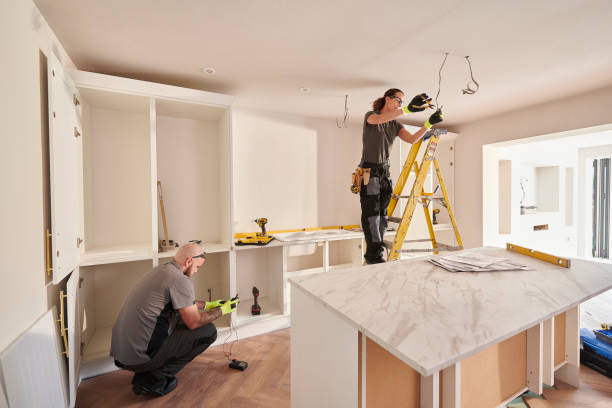Home improvement projects are significant investments that require expertise, precision, and a trustworthy partner to bring your vision to life. Whether you’re remodelling your kitchen, updating your bathroom, or giving your entire home a facelift, finding the best home improvement contractor is essential. In this comprehensive guide, we’ll explore how to choose the right contractor, what to expect during the renovation process, and key considerations to ensure your project succeeds.
Why Choosing the Right Home Improvement Contractor Matters
The success of your renovation largely depends on the skill and professionalism of your contractor. A qualified contractor can:
- Deliver quality craftsmanship that enhances your home’s value.
- Ensure timely project completion within your budget.
- Offer expert advice on materials, design, and functionality.
- Prevent costly mistakes and unnecessary delays.
Choosing the wrong contractor, however, can lead to financial loss, stress, and unsatisfactory results.
Steps to Find the Best Home Improvement Contractor
1. Define Your Project Goals
Before searching for a contractor, outline your project’s scope, budget, and timeline. Be as specific as possible about your needs, preferences, and must-haves.
- Example: If you’re renovating your kitchen, list details like countertop materials, cabinet designs, and appliance placements.
2. Seek Recommendations
Ask friends, family, and colleagues for referrals. Personal recommendations often lead to trustworthy contractors. Additionally, explore online reviews and ratings on platforms like:
- Angi (formerly Angie’s List)
- HomeAdvisor
- Yelp
Look for contractors with consistently high ratings and glowing testimonials.
3. Verify Credentials
Ensure the contractor is licensed, insured, and bonded. Licensing confirms that they meet industry standards, while insurance protects you from liability in case of accidents.
- Check their certifications: Membership in professional organizations, such as the National Association of Home Builders (NAHB), can indicate a commitment to excellence.
4. Request Multiple Quotes
Contact three contractors to compare their pricing, services, and timelines. Avoid automatically choosing the lowest bid; focus on value and quality instead.
Red Flags to Watch Out For
Choosing a contractor requires diligence. Be cautious of:
- Unusually low bids: They may indicate subpar materials or hidden fees.
- Lack of references: Reputable contractors should provide references and a portfolio of previous work.
- High-pressure sales tactics: A trustworthy contractor will allow you time to make informed decisions.
Questions to Ask Potential Contractors
When interviewing contractors, ask detailed questions to gauge their expertise and compatibility with your project:
- How many years of experience do you have?
- Can you provide references and examples of similar projects?
- What is your process for managing timelines and budgets?
- Do you handle permits and inspections?
- What warranties or guarantees do you offer?
The Importance of a Detailed Contract
Once you’ve selected a contractor, insist on a comprehensive written contract. The contract should include:
- Scope of work: Detailed descriptions of tasks and responsibilities.
- Timeline: Start and completion dates.
- Payment terms: Clear breakdown of costs, including labour, materials, and contingency funds.
- Change order policies: Procedures for managing alterations to the original plan.
Managing the Renovation Process
1. Maintain Open Communication
Regular updates and clear communication with your contractor help ensure the project stays on track. Schedule weekly check-ins and address concerns promptly.
2. Stay Involved
Visit the worksite frequently to monitor progress and ensure the work meets your expectations. Don’t hesitate to ask questions or request clarifications.
3. Handle Changes Effectively
Changes may arise during the renovation due to unforeseen issues or evolving preferences. Address these promptly and document them in writing.
Post-Renovation Tips
After your project is complete:
- Inspect the work thoroughly: Ensure that all tasks in the contract have been completed to your satisfaction.
- Collect warranties: Secure all warranties for materials and quality.
- Leave a review: Share your experience to help others find reliable contractors.
Common Types of Home Improvement Projects
1. Kitchen Remodeling
Modern kitchens are often the heart of the home. A professional contractor can upgrade your space with:
- Custom cabinetry
- Quartz or granite countertops
- Energy-efficient appliances
- Stylish backsplashes and flooring
2. Bathroom Upgrades
Enhance your bathroom with features like:
- Walk-in showers
- Freestanding tubs
- Heated floors
- Smart fixtures
3. Basement Finishing
Transform your basement into a functional space such as a home office, gym, or entertainment area.
4. Exterior Renovations
Boost curb appeal with updates to:
- Siding and roofing
- Windows and doors
- Landscaping and outdoor living spaces
Benefits of Hiring a Professional Contractor
Working with a seasoned contractor provides peace of mind. You’ll benefit from:
- Expert project management: Professional contractors handle logistics, from securing permits to sourcing materials.
- Access to premium resources: Established contractors often have relationships with suppliers, ensuring high-quality materials at competitive prices.
- Code compliance: Professionals ensure your project adheres to local building codes and regulations.
Conclusion
Finding the best home improvement contractor is the cornerstone of a successful renovation. By following the steps outlined in this guide, you’ll be well-equipped to select a skilled, reliable partner who can bring your vision to life with excellence.
